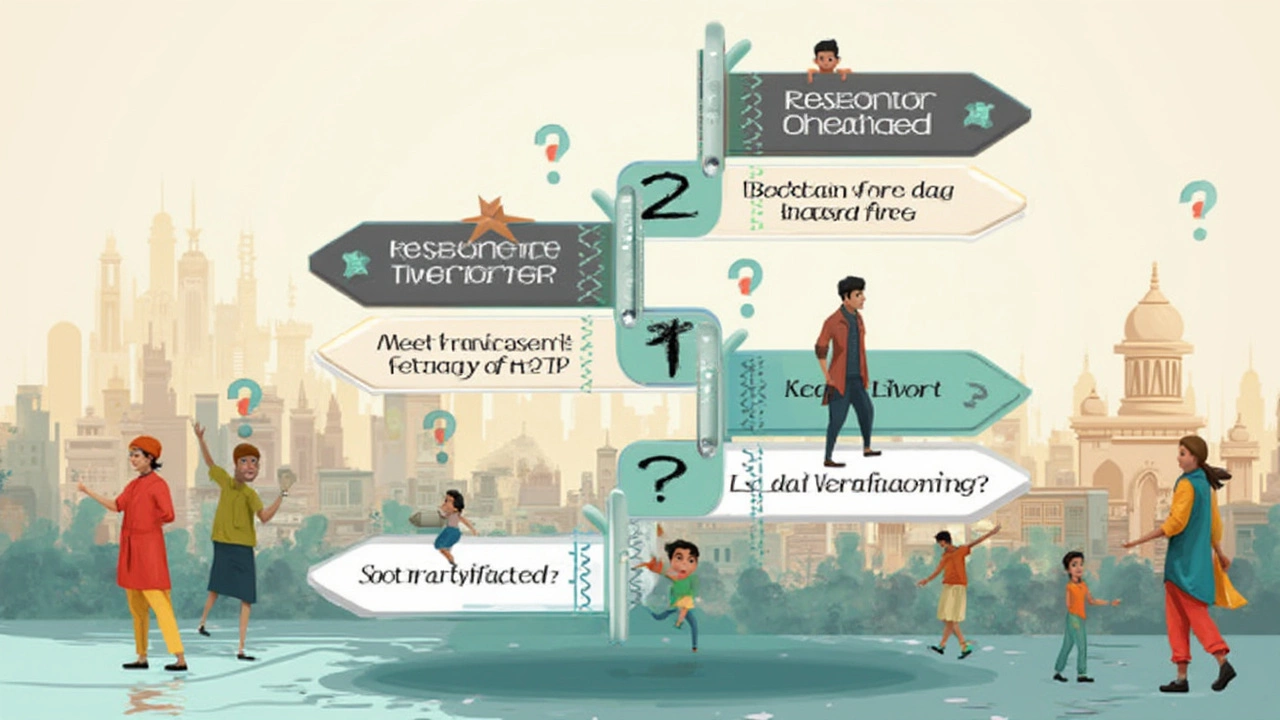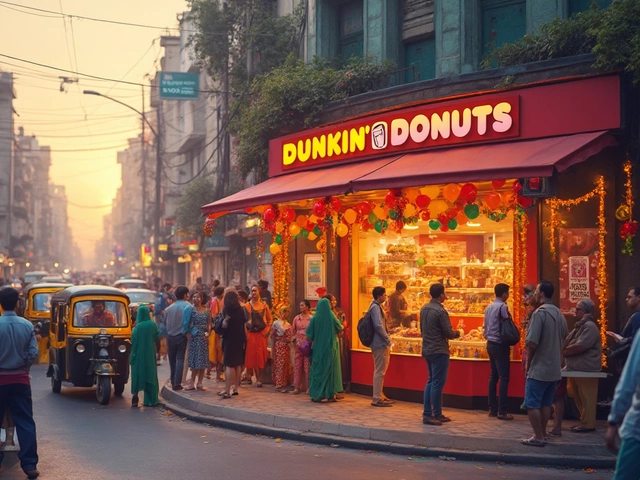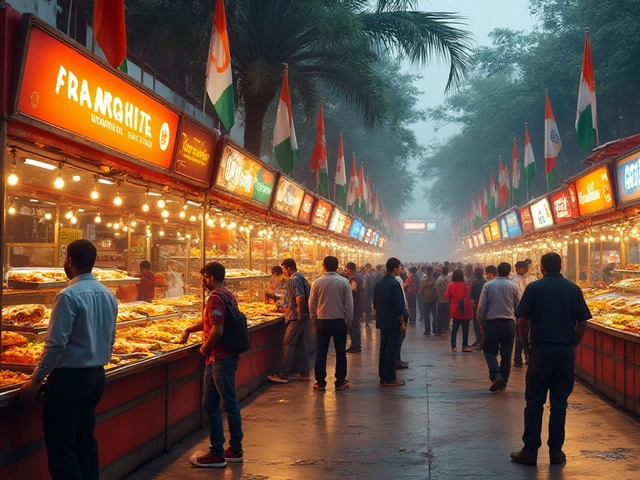Ever wondered why franchise brands are popping up on every corner these days? It isn’t just McDonald’s anymore. From momos stalls to laundry chains, India’s franchise scene is exploding—and it’s not just in big cities. Small towns see it too, and that’s not by accident. Franchises work because the model is all about running a proven business with a well-known name and ready-made support.
Here’s what surprises most people: you don’t need a business background to get started. You need the right info, some money, and a whole lot of curiosity. Plenty of food chains, salons, and even schools offer franchises, with investment levels from less than ₹5 lakh to over ₹1 crore. It’s not a free pass to easy profits—there’s paperwork, fees, and lots of rules. Still, if you want to skip the stress of building a business from scratch, this can be a shortcut.
So, how do you actually go from “I want a franchise” to signing a deal and opening your doors? It’s not just about liking a brand or having some savings. There’s a clear step-by-step process for picking the right franchise, understanding costs, dealing with legal stuff, and actually getting approved. No point jumping in blind—you want to know what you’re getting into before you put down a single rupee.
- What Is a Franchise and Why Choose One?
- Finding the Right Franchise in India
- Costs and Legal Steps You Can’t Ignore
- Application and Approval Process
- Tips for a Strong Franchise Start
What Is a Franchise and Why Choose One?
A franchise is pretty much a business model where you pay to use an established brand’s name, products, and training. You don’t invent something new—you follow their rules and get their playbook. You get to sell stuff or services people already trust, whether it's burgers, salons, or cleaning services.
There’s a reason franchises are everywhere: people like buying from brands they know. In India, for example, Domino’s has almost 1,700 outlets, and more than 90% are run by franchisees. That’s massive. Wonder why? You’re not left alone after you pay the franchise fee. You get step-by-step help with setup, ads, training, and sometimes even staff hiring.
Check out this simple breakdown of what makes franchising a go-to option:
- franchise in India means joining a business with a proven profit formula.
- You get built-in marketing—think of all those “Grand Opening” ads you see.
- Initial training is usually part of the package. You don’t have to figure out how things work by yourself.
- Lower risk compared to starting on your own; research from Franchise India Holdings shows 80% of franchises survive past their first five years, compared to under 20% for solo startups.
When people talk about why they pick a franchise, here’s what comes up the most:
- Faster launch (no waiting months for brand-building)
- More support than you get as an independent business
- Access to bulk buying lowers day-to-day costs
- More trust from customers right from day one
Here’s a quick look at how different types of franchises stack up in India:
| Type | Popular Brands | Average Investment (₹) | Return Timeline |
|---|---|---|---|
| Food & Beverage | Subway, Haldiram’s | 7 lakh – 2 crore | 18–36 months |
| Retail | Bata, FirstCry | 10 lakh – 50 lakh | 12–30 months |
| Education | Kumon, EuroKids | 5 lakh – 50 lakh | 18–30 months |
The basic idea: if you pick the right brand and location, you skip the grind of building a business from zero. Franchises hand you the blueprint so you can focus on growing instead of guessing what works.
Finding the Right Franchise in India
Here’s the thing—there are thousands of franchise options out there, but not all of them are a good fit for you. Step one is to get real about what you want. Are you after quick returns or are you ready to stick it out for a few years? Food and beverage franchises get a lot of love in India because they’re everywhere. Popular ones in 2024, like Wow! Momo, Subway, and Chai Sutta Bar, aren’t just in malls—they’ve expanded into Tier 2 and Tier 3 cities too.
Don’t just copy your neighbor’s move. Different industries have different pros and cons. Something like a preschool franchise (think Kidzee or EuroKids) can work well if you have a quiet location and want lower staff headaches. Salons like Jawed Habib or juice chains like Drunken Monkey are in demand as well. Each comes with its own set of rules about training, supply chains, and fees.
Now, the biggest mistake people make: skipping the research. Jumping in just because a brand is famous can backfire. Be nosey—ask existing franchisees about sales, support, and what keeps them up at night. Visit different locations and see what’s working. Don’t just rely on brochures. Some bad apples promise the world but vanish after they collect the franchise fee.
- Check the brand’s history in India—how many outlets have actually opened, and how many have quietly shut down?
- Talk to at least three existing franchise owners (not just the ones the company recommends).
- See if the brand does active marketing. A stale franchise with no buzz is risky.
- Figure out if you need prime city real estate or if the model works in a smaller town.
- Look for full transparency around costs—hidden charges can blow your budget.
For a quick comparison of popular franchise types, check this:
| Type | Starting Investment (₹) | Estimated ROI Period | Typical Support Offered |
|---|---|---|---|
| Food & Beverage | 5 lakh - 1 crore | 12-24 months | Branding, Menu, Operations Training |
| Education/Preschool | 8 lakh - 30 lakh | 18-36 months | Curriculum, Training, Marketing |
| Salon/Beauty | 10 lakh - 50 lakh | 12-24 months | Setup, Product Supply, Marketing |
| Retail | 3 lakh - 40 lakh | 15-30 months | Merchandise, Staff Training |
Biggest tip? Don’t chase the cheapest deal. Sometimes a higher upfront cost brings solid training, better product supply, or stronger marketing support. Picking the right franchise in India isn’t about just grabbing what’s hot or trending—it’s about what matches your time, money, location, and risk appetite. The smartest move is slow research before fast action.

Costs and Legal Steps You Can’t Ignore
The first thing that hits most new franchisees is how much you actually need to spend upfront. It’s not just the franchise fee. There’s rent, interiors, wages, inventory, and taxes. For example, in 2025, popular food brands like Domino’s are asking for a franchise fee of ₹5–7 lakh, but your total investment goes above ₹30 lakh after store setup and working capital. Even budget brands—think tea kiosks—usually want at least ₹5–10 lakh to get your doors open.
Here’s a basic breakdown of likely costs:
- Franchise Fee: One-time payment to use the brand. Can range from ₹50,000 (simple kiosk brands) up to ₹50 lakh (well-known international chains).
- Royalty Fee: Ongoing, usually 4–10% of monthly sales, paid to the parent company. Some waive this for new locations.
- Store Setup: Interior design, furniture, equipment—easily 50–70% of your initial spend.
- Working Capital: Cash to run operations (salaries, stock, marketing) while sales ramp up.
- Rent & Utilities: This can be the killer in big cities, and is non-negotiable.
| Brand Type | Franchise Fee (₹) | Total Setup Cost (₹) | Royalty Fee |
|---|---|---|---|
| Popular Fast Food | 5–7 lakh | 30–50 lakh | 6% of sales |
| Beverage Chain | 1–3 lakh | 8–15 lakh | 5% of sales |
| Budget Food Kiosk | 50,000–1 lakh | 5–10 lakh | Flat fee or 4% of sales |
Now for the legal part—skip it, and you’ll regret it. In India, franchise businesses are watched under contracts law, not any special franchise law. What matters is your agreement.
- Read the Franchise Disclosure Document (FDD) closely. It lists fees, expectations, lock-in periods, and all penalties. Brands with nothing to hide give this to you upfront. If not, red flag.
- Make sure the deal covers territory rights. Can the brand open another outlet next door? If the agreement skips this, you risk cannibalizing your own sales.
- Pay close attention to exit clauses—sometimes you can’t walk away for years, or you get no refund if things go south.
- Ask if support and training fees are included, or if there are hidden charges (extra fees for marketing, supply chain, software, etc.).
Don’t wing it with paperwork. Get a lawyer who’s handled franchise in India deals before. Spending a little on legal advice now is cheaper than fighting a bad contract later. And before you sign, double-check that the brand is registered with the Ministry of Corporate Affairs. It doesn’t guarantee honesty, but it helps weed out the fakes.
Application and Approval Process
Ready to take the plunge? It’s not just a handshake or a fast payment. There’s a system you’ll follow, and even a small mistake can set you back weeks. First up, every franchise brand has an application form—sometimes online, sometimes you download and email it back. Don’t glaze over it. They ask about your finances, where you want to open, your past work, and sometimes even your family background.
Most of the bigger Indian franchise companies (think Café Coffee Day, Apollo Diagnostics, or Jio Mart) will run a background check. They want people who can run a business, handle money, and stick with the brand. If you fudge numbers, they’ll catch it. When you press “submit,” expect to wait. Shortlisted applicants usually get a phone call or email inviting them for a meeting—these can happen in person or on Zoom.
This meeting is a big deal. It’s your chance to ask tough questions about support, fees, training, even how much money current franchisees are making. The brand’s rep will grill you too—they want to know if you’re in this for the long haul. By the way, don’t say yes to everything—a good company wants pushback because it shows you’re serious.
After this, you might get asked for more paperwork—proof of funds (statements, tax returns), identity documents, and sometimes a business plan. Some brands (especially global ones) have two or three interview rounds. If you’re still in the running, you’ll get a copy of the franchise agreement. Always get a lawyer to check it, even if it feels like overkill. A lot of folks just sign—and regret it the moment real costs or restrictions show up.
Once you sign, you pay the initial franchise fee, which can be anywhere from ₹50,000 to ₹50 lakh or more. Only after this will you get official training, site visits, branding guidelines, and marketing materials. Don’t start renting or renovating a shop until you get the green light in writing.
- Fill out the full application—be honest and detailed.
- Attend interviews and meetings—come prepared with questions and paperwork.
- Get your finances in order—proof is always needed.
- Have the franchise agreement reviewed by a legal expert who knows Indian business law.
- Only pay the fee after you’re 100% clear on all the terms and your responsibilities.
This whole approval cycle usually takes one to three months for local brands, and up to six months if you’re aiming for the big global names. Patience pays, so don’t rush any stage. When it comes to franchise in India, getting the application right literally decides your success odds before you even open your doors.

Tips for a Strong Franchise Start
Getting your franchise running smooth from day one isn’t about luck—it's all about the moves you make right after signing that franchise agreement. Here’s what actually works in the real world.
- Franchise in India means strict brand rules, but don’t ignore your local market. Visit nearby branches of the same brand. Ask managers what works and what doesn’t. For example, a Delhi outlet might do better with more vegetarian options, while a Bengaluru location might find value in speedy delivery.
- Train your staff right away. Franchisors offer their own programs, but let’s be real—these aren’t always tailored to your area. Add in local tips and teach your team about the kind of customers you’ll see. Small things, like speaking the local language or understanding local habits, can turn occasional customers into regulars.
- Track all your costs, not just the big ones. Surprises like signboard fees from municipalities or local GST quirks have knocked out first-timers before. Apps like Zoho Books or Tally are popular in India and can help you keep an eye on daily expenses and taxes.
- Don’t treat marketing as optional. Most brands provide some promotion, but it’s rarely enough. Use WhatsApp groups, Facebook communities, and local influencers. A small bakery in Indore grew sales by 30% just by launching a Sunday deal on residential WhatsApp groups.
- Talk regularly with your franchisor and other franchisees. There are active WhatsApp and Telegram groups where Indian franchise owners share hacks, from negotiating rent to handling tough customers. You might save thousands by using a tip someone drops in your group chat.
Start with these steps, and you’ll avoid the usual rookie mistakes. Stay alert, listen to local feedback, and tweak your approach every few weeks. Franchising isn’t just about following the rules—it's about playing smart with local realities.


